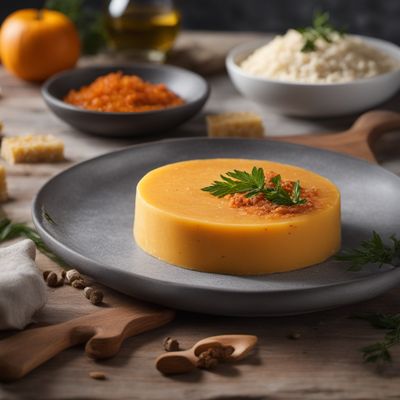
Ingredient
Cheese, mahon
The Quintessential Taste of Mahon: Exploring the Richness of Mahon Cheese
Mahon cheese is a semi-hard cow's milk cheese with a pale yellow interior and a natural rind. It has a smooth and creamy texture, which becomes slightly crumbly as it ages. The cheese is known for its tangy and slightly salty taste, with hints of fruitiness and nuttiness. Its appearance is characterized by small irregular holes scattered throughout the cheese.
Origins and history
Mahon cheese originates from the island of Menorca in Spain, where it has been produced for centuries. It holds a Protected Designation of Origin (PDO) status, ensuring its authenticity and adherence to traditional production methods. The cheese has deep cultural significance in Menorca and is deeply rooted in the island's gastronomic heritage.
Nutritional information
Mahon cheese is a good source of protein, calcium, and phosphorus. It also contains essential vitamins such as vitamin A and vitamin B12. A 1-ounce serving of Mahon cheese provides approximately 110 calories.
Allergens
Mahon cheese contains milk and is not suitable for individuals with lactose intolerance or milk allergies.
How to select
When selecting Mahon cheese, look for a cheese that has a firm texture and a slightly oily surface. Avoid cheeses with any signs of mold or excessive dryness. Opt for cheeses that have been aged for at least three months for a more pronounced flavor.
Storage recommendations
To maintain the freshness and quality of Mahon cheese, it should be stored in the refrigerator. Wrap it tightly in wax paper or aluminum foil to prevent it from drying out. It is recommended to consume the cheese within a week of opening.
How to produce
Mahon cheese production requires specialized knowledge and equipment. It is best left to professional cheesemakers who follow traditional methods of production.
Preparation tips
Mahon cheese is incredibly versatile and can be enjoyed in various ways. It can be sliced and served on a cheese platter, grated over pasta dishes, melted in sandwiches or quesadillas, or even used as a topping for salads. Its tangy flavor pairs well with fruits, nuts, and cured meats.
Substitutions
A suitable substitute for Mahon cheese would be a semi-hard cheese with a tangy and slightly salty flavor, such as Pecorino Romano or aged Cheddar.
Culinary uses
Mahon cheese is commonly used in Spanish cuisine, particularly in dishes like "Tumbet" (a vegetable casserole), "Coca de Trampó" (a savory pastry), and "Queso Mahón-Menorca" (a traditional cheese spread). It can also be enjoyed on its own or paired with fruits and wines.
Availability
Mahon cheese is primarily available in Spain, particularly in the region of Menorca. It can also be found in specialty cheese shops or gourmet stores in other countries.
More ingredients from this category » Browse all

Cheese, kefalotyri
The Bold Greek Delight

Cheese, samsoe
The Savory Delight: Unveiling the Secrets of Samsoe Cheese

Cheese, cheddar
"The King of Cheeses: Unveiling the Richness of Cheddar"

Cheese, aged graviera
Savory Greek Delight

Cheese, idiazabal
The Basque Treasure

Cheese, coolea
Coolea Cheese: A Taste of Irish Craftsmanship

Cheese, hoch ybrig
The Alpine Delight: Unveiling the Richness of Hoch Ybrig Cheese

Cheese, cacio di fossa
The Hidden Gem of Italian Cheeses: Cacio di Fossa

Cheese, montasio
The Alpine Delight: Exploring the Richness of Montasio Cheese

Cheese, schabziger
The Alpine Secret: Unveiling the Tangy Delights of Schabziger Cheese

Cheese, evora
Evora: A Portuguese Delight

Cheese, leyden
The Dutch Delight: Unveiling the Savory Secrets of Leyden Cheese
Recipes using Cheese, mahon

Balearic Gordita
Mediterranean Stuffed Flatbread: A Balearic Twist on a Mexican Classic

Balearic Panino
Mediterranean Delight: Balearic Panino - A Fusion of Italian and Balearic Flavors

Pique Criollo Adapted to Minorcan Cuisine
Minorcan Pique Criollo: A Spicy Fusion of Colombian and Balearic Flavors

Nicanores de Boñar
Savory Spanish Cheese Fritters